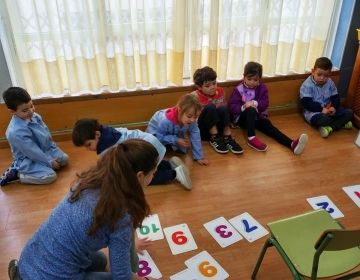
Language and Culture Assistants in Spain
An Overview
Language and Culture Assistants (Auxiliares de Conversación) in Spain support local teachers at public schools and facilitate conversational activities and cultural exchange lessons in English. As a Language and Culture Assistant, you will assist classes or small groups of students to develop their listening and conversational skills, as well as their understanding of your home culture. Exact responsibilities of Language and Culture Assistants vary according to each individual school. However, you won’t be left alone with an entire class of students, nor will you be responsible for grading, discipline, or the independent supervision of students.
Learn About the Impact This Role Can Have On Your Students and Yourself
Featured Posts
A day in the Life of a Language and Culture Assistant
My alarm sounds at 9am. I yawn and fumble to silence the overly-energetic jingle. It’s Tuesday, the beginning of my “work-week”. My host family is already at school and work... keep reading
A Day in the Life of a Language Assistant in Madrid
I participated in CIEE's Teach in Spain program from 2015-2017 and was placed outside of Madrid central in the municipality, Collado Villalba. Upon receiving my placement, I was quite nervous... keep reading
One Month as a Language Assistant
When I quit teaching fourth grade in 2015, I was fairly certain I would never go back. Yet here I am, teaching in Spain, remembering why I loved it- the... keep reading
FAQs
To be considered for the Language and Culture Assistant position you must:
- Be a native English speaker
- Hold a bachelor’s degree in any field
- Be a citizen in the United States, Canada, Australia, Ireland, or New Zealand
TEFL certification is not required for most teaching assistant positions, but it will give you the confidence and resources to effectively teach English to foreign language learners. Taking TEFL before you teach abroad can help you think about the English language from another perspective and understand how to teach English grammar. Teaching and preparing activities, whether for a small or large group of students, can be daunting. Additionally, we strongly recommend getting TEFL certified if you are considering ESL as a career, or want to teach abroad independently in the future, as most foreign schools will require full-time teachers to be TEFL certified. Learn more about CIEE’s online TEFL certification programs!
Language and Culture assistants in Spain can expect to work 12-16 hours per week, depending on region. Regardless of location assistants will enjoy a four day work week. While you’re physically in the classroom 12-16 hours a week, you may be invited to work gatherings or professional development sessions for a few additional hours a week. As noted above, exact responsibilities of Language and Culture Assistants vary according to each individual school. However, you won’t be left alone with an entire class of students, nor will you be responsible for grading, discipline, or the independent supervision of students.
Unless you have dual citizenship in an EU country, you’ll need a Spanish Student Visa to participate in the Language and Culture Assistant programs in Spain. For those who haven’t used one before, a visa is an official page stamped into your passport that allows you to 1) enter Spain and 2) apply for temporary residency with the local authorities. Visas are usually valid for 90 days, which is plenty of time to receive your residency documents that cover the remainder of your program in Spain.
Language and Culture Assistants in Spain typically work from October to June and receive a monthly stipend between €850-€1,000 depending on location. For most people, this is adequate to afford a comfortable lifestyle. If you’re careful with spending, you’ll have some money for fun and to explore Spain and other European countries. Your income will go further outside of city centers where the cost of shared accommodations, food, transportation, entertainment, etc., is lower.
Find the Program That’s Right for You
CIEE has a variety of different programs for you to teach English in Spain as a language and cultural assistant. These programs have placements in the community of Madrid and Murcia. Assistants in the Community of Madrid teach 16 hours per week and receive a monthly stipend of €1,000. Whereas in Murcia, with a lower cost of living, assistants will earn €875 a month and work 15 hours per week. Both locations offer 4-day works weeks. With Mondays or Fridays off every week, you’ll have three-day weekends and plenty of time to explore Spain and the rest of Europe!


